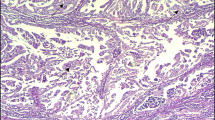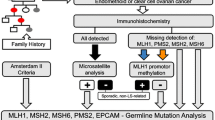Abstract
Lynch syndrome is an autosomal dominant cancer-susceptibility disorder caused by mutations in DNA mismatch repair genes. Women with Lynch syndrome have an increased lifetime risk for endometrial and ovarian cancers. While there is evidence of efficacy for prophylactic surgery, no standard recommendations have been developed to support screening for premalignant endometrial and ovarian epithelial lesions in high-risk women. Here, we report a case of a healthy woman carrying a germline mutation in MLH1 gene with endometrial intra-epithelial neoplasia and ovarian endometriotic lesions exhibiting a loss of MLH1 protein expression. This case report illustrates the malignant potential of endometriosis, and highlights the need for a meticulous management of gynecologic premalignant precursor lesions in reducing cancer risk among related Lynch syndrome women.


Similar content being viewed by others
Abbreviations
- HNPCC:
-
Hereditary non-polyposis colorectal cancer
- MMR:
-
DNA mismatch repair system
- MSI:
-
Microsatellite instability
References
Lynch HT, de la Chapelle A (2003) Hereditary colorectal cancer. N Engl J Med 348:919–932
Schmeler KM, Lynch HT, Chen LM et al (2006) Prophylactic surgery to reduce the risk of gynecologic cancers in the Lynch syndrome. N Engl J Med 354:261–269
Seiden MV, Patel D, O’Neill MJ, Oliva E (2007) Case records of the Massachusetts General Hospital. Case 13–2007. A 46-year-old woman with gynecologic and intestinal cancers. N Engl J Med 356:1760–1769
Boland CR, Thibodeau SN, Hamilton SR et al (1998) A National Cancer Institute Workshop on Microsatellite Instability for cancer detection and familial predisposition: development of international criteria for the determination of microsatellite instability in colorectal cancer. Cancer Res 58:5248–5257
Wang Q, Desseigne F, Lasset C et al (1997) Germline hMSH2 and hMLH1 gene mutations in incomplete HNPCC families. Int J Cancer 73:831–836
Lindor NM, Petersen GM, Hadley DW et al (2006) Recommendations for the care of individuals with an inherited predisposition to Lynch syndrome: a systematic review. JAMA 296:1507–1517
Mutter GL, Baak JP, Crum CP, Richart RM, Ferenczy A, Faquin WC (2000) Endometrial precancer diagnosis by histopathology, clonal analysis, and computerized morphometry. J Pathol 190:462–469
Esteller M, Catasus L, Matias-Guiu X et al (1999) hMLH1 promoter hypermethylation is an early event in human endometrial tumorigenesis. Am J Pathol 155:1767–1772
Simpkins SB, Bocker T, Swisher EM et al (1999) MLH1 promoter methylation and gene silencing is the primary cause of microsatellite instability in sporadic endometrial cancers. Hum Mol Genet 8:661–666
Knudson AG (1996) Hereditary cancer: two hits revisited. J Cancer Res Clin Oncol 122:135–140
Kinzler KW, Vogelstein B (1997) Cancer-susceptibility genes. Gatekeepers and caretakers. Nature 386:761–763
Rahner N, Friedrichs N, Steinke V et al (2008) Coexisting somatic promoter hypermethylation and pathogenic MLH1 germline mutation in Lynch syndrome. J Pathol 214:10–16
Ollikainen M, Hannelius U, Lindgren CM et al (2007) Mechanisms of inactivation of MLH1 in hereditary nonpolyposis colorectal carcinoma: a novel approach. Oncogene 26:4541–4549
Hemminki K, Aaltonen L, Li X (2003) Subsequent primary malignancies after endometrial carcinoma and ovarian carcinoma. Cancer 97:2432–2439
Lynch HT, de la Chapelle A (1999) Genetic susceptibility to non-polyposis colorectal cancer. J Med Genet 36:801–818
Watson P, Bützow R, Lynch HT et al (2001) The clinical features of ovarian cancer in hereditary nonpolyposis colorectal cancer. Gynecol Oncol 82:223–228
Varma R, Rollason T, Gupta JK, Maher ER (2004) Endometriosis and the neoplastic process. Reproduction 127:293–304
Martini M, Ciccarone M, Garganese G et al (2002) Possible involvement of hMLH1, p16(INK4a) and PTEN in the malignant transformation of endometriosis. Int J Cancer 102:398–406
Prowse AH, Manek S, Varma R et al (2006) Molecular genetic evidence that endometriosis is a precursor of ovarian cancer. Int J Cancer 119:556–562
Nezhat F, Datta MS, Hanson V et al (2008) The relationship of endometriosis and ovarian malignancy: a review. Fertil Steril 90:1559–1570
Ballweg ML (2004) Impact of endometriosis on women’s health: comparative historical data show that the earlier the onset, the more severe the disease. Best Pract Res Clin Obstet Gynaecol 18:201–218
Matsuo K, Alonsozana EL, Eno ML, Rosenshein NB, Im DD (2009) Primary peritoneal clear cell adenocarcinoma arising in previous abdominal scar for endometriosis surgery. Arch Gynecol Obstet 280:637–641
Dove-Edwin I, Boks D, Goff S et al (2002) The outcome of endometrial carcinoma surveillance by ultrasound scan in women at risk of hereditary nonpolyposis colorectal carcinoma and familial colorectal carcinoma. Cancer 94:1708–1712
Järvinen HJ, Renkonen-Sinisalo L, Aktán-Collán K, Peltomäki P, Aaltonen LA, Mecklin JP (2009) Ten years after mutation testing for Lynch syndrome: cancer incidence and outcome in mutation-positive and mutation-negative family members. J Clin Oncol 27:4793–4797
Author information
Authors and Affiliations
Corresponding author
Rights and permissions
About this article
Cite this article
Nyiraneza, C., Marbaix, E., Smets, M. et al. High risk for neoplastic transformation of endometriosis in a carrier of lynch syndrome. Familial Cancer 9, 383–387 (2010). https://doi.org/10.1007/s10689-010-9321-1
Published:
Issue Date:
DOI: https://doi.org/10.1007/s10689-010-9321-1




